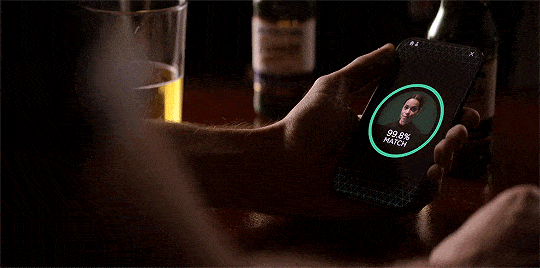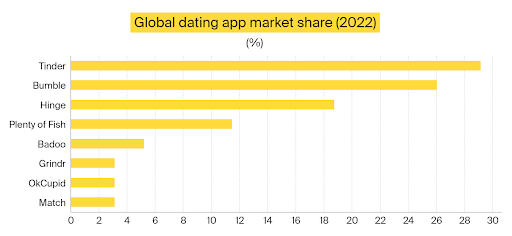AI dating apps: assessing the impact
For the purposes of this article, we investigated how prominent dating technology companies incorporate artificial intelligence into their products. These findings enabled us to categorize all AI use cases in dating apps into three broad categories: finding better matches, developing deeper connections, and improving the dating app user experience.
1. AI-powered dating apps help users find more compatible partners
Early dating websites and apps, such as Match.com, eHarmony, and Grindr, only allowed users to search for potential partners based on age, gender, location, sexual orientation, and shared interests—basically the same filters found in any mobile application with social features. As a result, single-and-looking people had to scroll through thousands of profiles corresponding to their search criteria.
Today, machine learning (ML) models can do the job for you.
Dating apps that use AI may identify common facial features in profile pictures of users a person has swapped left or right and figure out their dating type. Given that only 35% of couples hit it off after meeting in person for the first time, resolving the physical attraction puzzle right away may be key to a more enjoyable online dating experience.
Iris Dating, an application that was launched in 2019 and now has over two million users, employs artificial intelligence to analyze users’ facial features and select people you’ll most likely find attractive. The application aims to learn new users’ preferences by asking them to rate random profile photos based on three criteria: “pass,” “maybe,” and “like.” After initial training, the machine learning model improves its understanding of your type and recommends profiles of users with similar appearances. The algorithm improves as you use the app more.
Aside from looks, AI may detect objects in images and show users more profiles of people who play the guitar or frolic on the beach in their photos. For example, Tinder harnesses Amazon Rekognition to detect personality markers and improve the matching algorithm for premium users. You can also tap into the app’s AI features to select a profile photo that best represents your personality.
The bad thing is, machine learning models need training data to make accurate predictions, so users still have to spend a lot of time in the app to get more likes and matches.
To streamline the process, AI dating apps allow lazy singles to search for potential partners who resemble celebrities. The feature is currently supported by Dating.AI and Badoo, a dating app veteran with a global audience of 60 million people. The celebrity doppelganger feature not only matches users with people who look like Bill Skarsgård or Gigi Hadid, but also helps them identify and avoid imposters.
Some dating AI applications go even further and attempt to predict the chemistry between two people based on their DNA profiles! Of course, we’re talking about DNA Romance, an app that uses artificial intelligence to match couples by linking their DNA samples to sixteen personality types according to the Myers-Briggs Type Indicator (MBTI).
2. AI dating apps encourage users to get to know each other better
Remember the Black Mirror’s Hang the DJ episode where a digital coach matched individuals into relationships? The artificial intelligence dating app, which ran on a Nest-like device, set expiration dates for relationships (some encounters lasted only a few minutes!) and analyzed breakups to find a better match.
Lasting, healthy relationships are defined by the amount of time we spend with a person. It is technically impossible to establish an emotional connection with someone if we put quantity over quality.
Artificial Intelligence Matchmaker (AIMM) is a real-world dating app that aims to solve this problem. Like the Black Mirror Coach system, the virtual assistant communicates with a person for at least one week before introducing them to other people. The AI-based dating application makes sure to suggest candidates one at a time, thus allowing users to learn a few things about each other and make a well-informed decision about whether they should stick together or move on to the next partner. The application also guides users through the matching process by arranging phone calls and offering dating advice.
Another example comes from Teaser AI, a novel application that allows you to set up two types of profiles—a regular one and an AI bot whose conversational style and personality resemble yours. Before chatting with someone who has piqued your interest, you can start a conversation with their digital counterpart to learn more about their interests, hobbies, and goals. While the app is still in development and may provide incorrect (and hilarious!) responses, such as implying that a 28-year-old woman has a 28-year-old son when, in fact, she has a dog, using an AI close to yourself to break the ice could be a game changer for shy, socially awkward daters.
3. AI dating applications improve the courting experience
An increasingly popular use of AI technology for dating apps revolves around improving the overall dating experience in a variety of ways other than partner matching:
-
Filtering fake accounts and inappropriate content. In a world where 72% of dating app users block other people’s profiles for misbehavior and offensive content, more dating applications turn to artificial intelligence to curb harassment. Tinder’s reporting system, for example, spots inappropriate language and prompts users to express their feelings about it. A team of researchers at the University of Warwick developed an algorithm that detects bot accounts with 99% accuracy based on IP addresses, messages, and stolen images. And a popular live streaming dating app uses machine learning to flag offensive content and block users who spread it.
-
Coming up with personalized recommendations. Sean Rad, Tinder CEO, defines artificial intelligence as a smart filter that knows what people are interested in and delivers content that best matches their interests. In addition to finding users with similar hobbies and aspirations, Lara, Match.com’s chatbot that works with Google Assistant, recommends ideal date locations in your area. Another example comes from eHarmony, whose AI studies user behavior to figure out the best time to email each other. Amori, a one-to-one audio chat app for meeting new friends and potential partners, features an AI-powered bot offering dating tips. If you’re new to online dating, you can download Blush, an AI dating app simulator designed to help you improve your communication skills before searching for a valentine on Tinder.
-
Offering writing assistance. Dating app users may spend weeks choosing perfect photos for their Tinder profiles and still get 14% fewer responses just because they’ve made two spelling mistakes in the About Me section. Proper grammar ranks higher on a potential date’s wishlist than good teeth and self-confidence! To create an AI dating app that automatically fixes typos and grammatical errors in profile sections and private messages, you could sync it with third-party writing assistants like Grammarly or Ginger over an API. This approach would help you free two birds with one key: in addition to checking users’ grammar, natural language processing (NLP) writing tools also conduct sentiment analysis to make sure a person sounds friendly and respectful. Forward-thinking appreneurs take this concept even further, infusing AI dating apps with generative artificial intelligence (Gen AI). Tools like Junia’s Dating App Message Reply Generator assist users in writing engaging messages based on text prompts while also scanning textual information in a user’s profile to determine whether they share hobbies and interests. Other dating apps, including YourMove AI and RIZZ, have already implemented similar AI functionality. Given that 75% of users surveyed by Kaspersky last year expressed an interest in using Gen AI—specifically, OpenAI’s ChatGPT—in dating apps to deliver perfect messages to their matches, online dating could quickly become one of the primary generative AI use cases.
How to create a dating app with AI capabilities: tips from ITRex
Between 1995 and 2017, the number of heterosexual couples who had initially met online increased from just 2% to 39%. This is even more true for same-sex couples, 60% of whom now begin a relationship on dating websites and apps.
Digital dating is flourishing for several reasons:
-
Even it were not for the pandemic, our lives have become more digital, and the amount of data we consume daily continues to grow
-
Younger people prefer to focus on their education and careers, meaning they have less time for in-person interactions with peers
-
Our well-being has skyrocketed in the past 20 years, and wealthy, educated individuals tend to socialize less
-
Dating apps reportedly lead to stronger marriages and higher marital satisfaction
-
Dating technology offers individuals with mental health conditions (one in five Americans) an opportunity to meet new people and hone their communication skills
But it is not all sunshine and butterflies for dating app startups.
In 2022, Match Group, the dating app behemoth that owns Tinder, Hinge, OkCupid, Meetic, and other popular websites and applications for finding love, took 62.7% of the global dating app market revenue, which topped $4.94 billion. And there are a slew of new startups vying for investors’ attention (and capital), including Snack, Candid, and Ditto, which aim to reimagine dating through video chats and AI.
With so many companies competing for a spot in the sun, what does it take to develop an AI-powered dating app with strong commercial appeal?
These tips from the ITRex dating app developers may give you a hint:
-
Come up with a unique idea. While making a dating app with artificial intelligence features will certainly give you a competitive edge over your rivals, you still have to bring something new to the table. Tastebuds, for example, matches people based on their musical interests. Applications like Ship and Chorus allow your friends to swipe profiles for you until they find a perfect match. Meanwhile, some apps go totally niche, focusing on LGBTQ+ and non-binary people only. One of ITRex’s customers, for example, saw increased engagement and user satisfaction with their dating portal after adding a third gender option for non-binary individuals. Your idea should be supported by a solid business plan that details your product development timeline, business model, and monetization strategy. While 35% of Americans who use dating apps have paid for the product or complementary services at some point, and there is a lot of money to be made, you must ensure that the model you choose will support your application’s growth and development.
-
Avoid scope creep. Although you may be tempted to create an AI dating app with all of the fancy features we discussed earlier, you should take it one step at a time and launch an application that meets the most basic user needs while emphasizing your product’s unique selling point. This “less is more” approach would help you better manage your software development team and budget and release the application faster.
-
Collect heaps of training data. To create an AI dating app that delivers on its promise, you need training data. Otherwise, your custom machine learning algorithms will be unable to recognize patterns in user behavior, make intelligent predictions, and improve over time. Unfortunately, it may be difficult to obtain training data for a matching algorithm unless you consider adding AI capabilities to an already popular app. Some dating app developers tackle this problem by running fake accounts on popular dating applications, artificially expanding the size of training datasets, or producing synthetic data using generative AI. For more information, see this guide to data preparation for machine learning. Once you build the AI system, you need to beta-test the application with different focus groups and tweak the algorithms based on user feedback
-
Make use of third-party AI software. We at ITRex believe in a technology-agnostic, vendor-neutral approach to software engineering. We also help our clients keep AI development costs down. That’s why we recommend that you utilize as many off-the-shelf frameworks, libraries, and SDKs as possible. So, if you find a suitable software-as-a-service (SaaS), self-hosted, or open-source facial recognition service to power your intelligent profile image suggestion feature, just go for it! And we’ll be more than happy to assist you with software customization and integration. That said, if you intend to use commercially available Gen AI tools for dating apps, you should be aware of the associated infrastructure costs. As your user base grows, the third-party service may charge you exorbitant fees for query processing. Check out our generative AI cost article for more information.
-
Address ethical issues head-on. Just like other AI-powered applications, dating apps are prone to bias. An example of this could be a dating app showing you only profiles of Caucasian partners if you’ve had similar matches in the past or downvoting your profile if you’re a person of color. One way to address this problem could be by using representative training data, evaluating algorithm performance in different user groups, and adding an intermediary explainable AI (XAI) layer on top of your algorithms. The latter approach may help you address one of the most pressing concerns about using AI for dating apps, particularly in matchmaking—namely, removing humans from the decision-making process. Also, it goes without saying that algorithms that slide into users’ direct messages and profile data should be 100% transparent and never leak personal information (let alone sell it to advertising companies). Separately, caution should be exercised when incorporating generative AI into dating apps. Users who rely solely on algorithm-generated content during online conversations risk disappointing their dates in real life because they lack AI’s wit and humor. When it comes to dating apps that feature chatbots rather than real people, such as Romantic AI, users may find themselves in a trap of their own creation. Falling in love with a fully customizable AI girlfriend who calls you “my hero” and is always available to chat is no longer a sci-fi movie script; it is the twisted reality we live in.
Dating apps use artificial intelligence to help users form finely tuned connections while protecting their mental and physical health, just as business analysts use AI to extract meaningful insights from massive amounts of corporate data. And if your company wants to dominate the growing dating application market, the best time to develop your AI dating app is now.
















